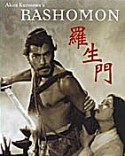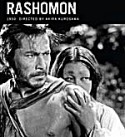 |
Available on DVD! To buy, click on link(s) below and help keep this site afloat (commissions earned) |
|
Always make sure of DVD-compatibility!!!
|
|
|
 |
|
| 
 Flix.com Flix.com
|
|
With the rain pouring, a vagabond (Kichijiro Ueda) seeks refuge at an
abandoned roadhouse, where he meets a priest (Minoru Chiaki) and a
woodcutter (Takashi Shimura), both of whom have just witnessed a trial
concerning rape and murder, and both of whom are in a puzzled state
because of the three vastly differing statements made at the trial, which
are special inasmuch as each of the three parties questioned takes the
murder-rap him-/herself:
- The rapist's tale: Thief Tajomaru (Toshiro Mifune) sees a samurai
(Masayuki Mori) and his beautiful wife (Machiko Kyo) pass by,
immediately knows he has to shag the wife, lures her husband into a
trap, ties him up and then rapes her before his very eyes. After that,
the wife begs the thief to free her husband and have a duel to the
death with him, just so her honour is restored. Tajomaru valiantly
fights, defeats and kills the samurai, but once that deed is gone, the
wife is gone.
- The wife's tale: After Tajomaru has raped her and has taken off, she
untied her husband and begged him to kill her, but he just stared at
her, in such a manner that she eventually killed him in some state of
trance. Later, she tried to kill herself too, albeit unsuccessfully.
- The samurai's tale: Since the thief and the wife's stories do
contradict each other, a medium (Noriko Honma) is called in to channel
the dead man's spirit. And the samurai tells the story like this:
After the rape, the wife asked the thief to kill her husband, a
request spoken in such cold blood that it leaves the thief nothing
less than disgusted. So instead of killing the samurai, the thief
offers to kill his wife instead, should he demand it - but the wife
manages to make an escape, and the thief fails to capture her. So he
returns to the samurai and cuts him free, as that is the least he can
do. Once freed, the samurai throws himself into his own knife.
None of these stories satisfies the vagabond, who is much smarter than
he appears to be, and eventually he figures that the woodcutter is the one
who knows the truthand manages to get the actual story out of him, a story
that leaves nobody innocent:
- The woodcutter's tale: After having raped the wife, the thief breaks
down crying over the unjustice he has done, begs for the woman's
forgiveness and even proposes to her - but the experience has
understanbably put her over the edge, and she demands him to kill her
husband, something the thief won't do - so she mocks both men enough
that they agree to duel each other, a duel though that's marked by
cowardice and clumsiness rather than being the valiant and courageous
display of bravery it has been in the theif's version of the story.
Eventually, the thief manages to slay the samurai if only just, but
the wife, who has also used the whole thing to get rid of her husband,
escapes.
This version of the story shatters the priest's belief in humanity.
Then the three men hear a baby crying nearby, and ultimately find an
abandoned toddler in the next room. The vagabond steals the richly
ornamented kimono next to the kid, upon which the woodcutter accuses him
of being a thief - a compliment the thief returns, because he has long
figured the woodcutter has stolen a valuable dagger from the scene of the
murder and thus not spoken up at the trial to tell the true story. Then he
takes off. The woodcutter though takes the child into his arms and
promises to raise it as one of his, which restores the priest's belief in
humanity ...

 Flix.com Flix.com
|
| |
In its very spartanic yet atmospheric treatment of big themes like
truth and lies and value and loss of humanity, coupled with the then novel
approach to storytelling (telling the plot from different points of view
over and over again), Akira Kurosawa created a masterpiece and very
probably his most enduring and popular film. And even watching it 60 years
later, when Rashomon has been quoted countless times, the film has
lost nothing of its freshness and originality, and remains the piece of
milestone cinema it has always been considered to be.
|